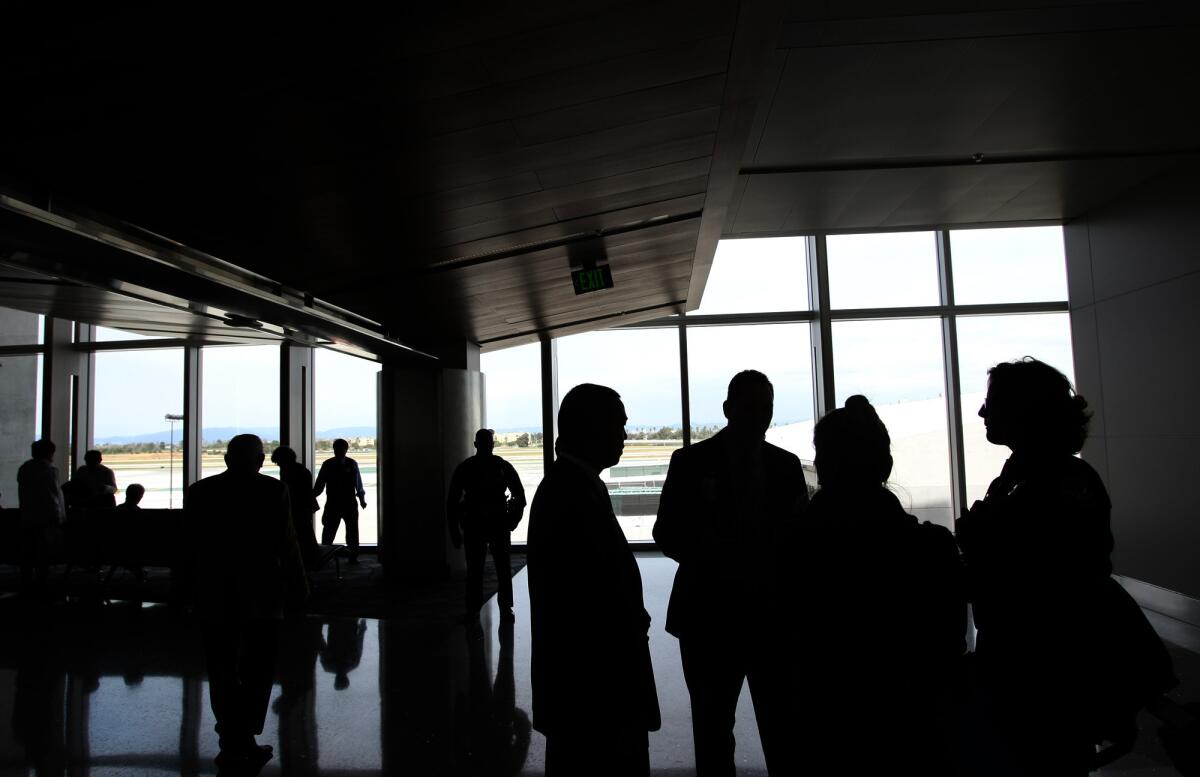Federal judge declares government no-fly list rules unconstitutional

- Share via
An Oregon federal judge ruled Tuesday that international air travel is a “sacred” liberty protected by the U.S. Constitution and ordered the government to amend its rules governing the so-called no-fly list, which seeks to prevent suspected terrorists from boarding airlines.
In the first such ruling of its kind, U.S. District Judge Anna J. Brown in Portland said that “international travel is not a mere convenience or luxury in this modern world. Indeed, for many, international travel is a necessary aspect of liberties sacred to members of a free society.”
Therefore, she said, the government must change its procedures to allow U.S. citizens who find themselves on the no-fly list to challenge the designation.
She ordered the government to come up with new procedures that protect citizens’ due-process rights without jeopardizing national security. Passengers must be given notice of their inclusion on the list and a rationale for the designation and be allowed to submit evidence to challenge it, Brown said.
Justice Department spokeswoman Dena Iverson said government lawyers were reviewing the decision, and declined to comment further.
Previously the government has argued that because other modes of travel on land and sea are available, there is no right to travel by air and no need to change the no-fly list procedures.
“Such an argument ignores the numerous reasons that an individual may have for wanting or needing to travel overseas quickly, such as the birth of a child, the death of a loved one, a business opportunity or a religious obligation,” Brown wrote. “A prohibition on flying turns routine international travel into an odyssey that imposes significant logistical, economic and physical demands on travelers.”
Federal investigators currently may include someone on the no-fly list based on a “reasonable suspicion” that an individual is a known or suspected terrorist. They do not routinely tell would-be passengers they are on the list or give any factual reason for the designation. The list, established after the attacks of Sept. 11, 2001, includes about 20,000 names, about 500 of them U.S. citizens.
A person who is denied the right to fly can challenge such a designation with the Department of Homeland Security. If the agency determines the inclusion is appropriate, the individual may seek to overturn the decision in federal court. The court reviews the government’s rationale but does not share the information with the individual concerned.
U.S. officials say the list is necessary to prevent hijackings and terrorist attacks. But Brown ruled that the current Homeland Security redress process had a high risk of depriving some innocent individuals of their “protected interests.”
In the lawsuit, 13 Muslim American plaintiffs, four of them veterans of the U.S. military, denied having any links to terrorism and said they learned of their no-fly status when they arrived at an airport and were blocked from boarding a plane.
The national American Civil Liberties Union and its affiliates in Oregon, California and New Mexico filed the lawsuit in June 2010. It was dismissed by the District Court, but in July 2012, the U.S. 9th Circuit Court of Appeals reversed the dismissal on jurisdictional grounds, allowing the lower court to consider the case.
One of the plaintiffs is Stephen D. Persaud of Irvine, who in 2010 was not allowed to fly home from the Virgin Islands unless he cooperated by giving information to an FBI agent. He eventually returned home by boat and train for the birth of his second child, but says he cannot fly to Saudi Arabia for the annual hajj pilgrimage made by Muslims.
Another plaintiff is Raymond E. Knaeble IV, an Army veteran from Chicago, who was barred from flying home in 2010 after flying to Bogota, Colombia, to marry his wife. He says he lost a job offer as a result. He eventually returned to the U.S. in a 12-day journey from Colombia to Panama City to California.
Sheik Mohamed Abdirahman Kariye, imam of Portland’s largest mosque, is also a plaintiff.
“Finally I will be able to challenge whatever incorrect information the government has been using to stigmatize me and keep me from flying,” Kariye said in a statement. “I have been prevented by the government from traveling to visit my family members and fulfill religious obligations for years, and it has had a devastating impact on all of us.”
timothy.phelps @latimes.com
michael.muskal @latimes.com
More to Read
Sign up for Essential California
The most important California stories and recommendations in your inbox every morning.
You may occasionally receive promotional content from the Los Angeles Times.















